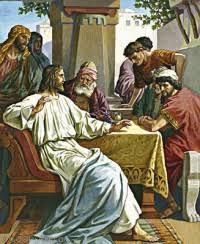Liturgical Readings for : Saturday, 4th November, 2023
Saturday of the 30th week in Ordinary Time, Year 1
Memorial of St Charles Borromero, bishop
FIRST READING
A reading from the letter of St Paul to the Romans 11:1-2. 11-12. 25-29
God never takes back his gifts or revokes his choice.
Let me put a question then: is it possible that God has rejected his people? Of course not. I, an Israelite, descended from Abraham through the tribe of Benjamin, could never agree that God had rejected his people, the people he chose specially long ago. Do you remember what scripture says of Elijah – how he complained to God about Israel’s behaviour?
Let me put another question then: have the Jews fallen for ever, or have they just stumbled? Obviously they have not fallen for ever: their fall, though, has saved the pagans in a way the Jews may now well emulate. Think of the extent to which the world, the pagan world, has benefited from their fall and defection – then think how much more it will benefit from the conversion of them all.

There is a hidden reason for all this, brothers, of which I do not want you to be ignorant, in case you think you know more than you do. One section of Israel has become blind, but this will last only until the whole pagan world has entered, and then after this the rest of Israel will be saved as well.
As scripture says: The liberator will come from Zion, he will banish godlessness from Jacob. And this is the covenant I will make with them when I take their sins away.
The Jews are enemies of God only with regard to the Good News, and enemies only for your sake; but as the chosen people, they are still loved by God, loved for the sake of their ancestors. God never takes back his gifts or revokes his choice.
The Word of the Lord. Thanks be to God.
Responsorial Psalm Ps 93
Response : The Lord will not abandon his people.
1. Happy the man whom you teach, O Lord, whom you train by means of your law:
to him you give peace in evil days. Response
2. The Lord will not abandon his people nor forsake those who are his own:
for judgement shall again be just and all true hearts shall uphold it. Response
3. If the Lord were not to help me, I would soon go down into the silence.
When 1 think: ‘1 have lost my foothold;’ your mercy, Lord, holds me up. Response
Gospel Acclamation Col 3: 16. 17
Alleluia, alleluia!
Let the message of Christ, in all its richness, find a home with you;
through him give thanks to God the Father.
Alleluia!
or
Alleluia, alleluia!
Shoulder my yoke and learn from me, says the Lord,
for I am gentle and humble in heart, and you will find rest for your souls.
Alleluia!
GOSPEL

The Lord be with you. And with your spirit
A reading from the holy Gospel according to Luke 14:1. 7-11 Glory to you, O Lord.
Everyone who exalts himself will be humbled, and the man who humbles himself will be exalted.
Now on a sabbath day Jesus had gone for a meal to the house of one of the leading Pharisees; and they watched him closely. He then told the guests a parable, because he had noticed how they picked the places of honour.
He said this,
‘When someone invites you to a wedding feast, do not take your seat in the place of honour. A more distinguished person than you may have been invited, and the person who invited you both may come and say, “Give up your place to this man”. And then, to your embarrassment, you would have to go and take the lowest place.
No; when you are a guest, make your way to the lowest place and sit there, so that, when your host comes, he may say, “My friend, move up higher”. In that way, everyone with you at the table will see you honoured. For everyone who exalts himself will be humbled, and the man who humbles himself will be exalted.’
The Gospel of the Lord. Praise to you, Lord Jesus Christ.
*******************************
Gospel Reflection Saturday, Thirtieth Week in Ordinary Time Luke 14:1, 7-11
The parable Jesus speaks in today’s gospel reading shows his awareness of the human tendency to seek honour. Those who are invited to a wedding feast in that culture tended to take their seat in the places of honour. I suppose in our culture it would be the equivalent of a guest making a beeline for what used to be called the top table. This is what Jesus refers to at the end of the gospel reading as exalting oneself. Jesus’ own disciples were not immune from this tendency. You may recall that on one occasion two of the leading members of the twelve, James and John, asked Jesus for the best seats at the banquet in the kingdom of God, the places of honour, one at his right and the other at his left.
On that occasion Jesus had to remind his two disciples that greatness in God’s kingdom, honour in God’s eyes, consists in the humble service of others, after the example of Jesus himself who came not to be served but to be served. Saint Paul says of Jesus that he emptied himself taking the form of a servant and that he humbled himself. It was because of his self-emptying, humble, service of others that God highly exalted him. As Jesus says at the end of our gospel reading, those who humble themselves will be exalted by God. This is Jesus’ message for us all, his disciples today. The humble service of others, without any seeking after honour, without any exalting of ourselves, is the path to the fullness of life. The only honour worth having is not the honour we seek for ourselves but the honour that God gives us.
________________________________
The Scripture Readings are taken from The Jerusalem Bible, published 1966 by Darton, Longman & Todd Ltd. and used with the permission of the publishers.












